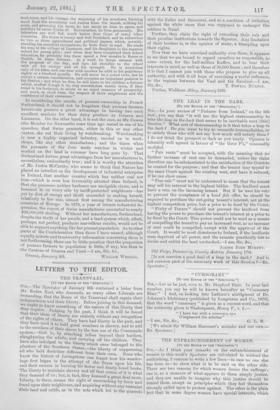THE LEAP IN THE DARK.
[To THE EDITOR OF THE " SPECTATOR."]
your review of " Pictures from Ireland," on the 8th inst., you say that " it will tax the highest statesmanship to take the leap in the dark that seems to be inevitable next [this] Session." What sort of statesmanship is it that takes a leap in the dark P Do you want to try to reconcile irreconcilables, or to satisfy those who will not say how much will satisfy them P I do not think the prospect so dark as you imply. Opinion is tolerably well agreed in favour of "the three F's," reasonably modified.
"Fair rents" must be accepted, with the meaning that no further increase of rent can be demanded, unless the claim therefore can be substantiated to the satisfaction of the Court to. be created for the purpose ; and that the tenant may appeal to the same Court against the existing rent, and have it reduced, if he can show cause.
" Free sale " must not be understood to mean that the tenant may sell his interest to the highest bidder. The landlord must have a veto on the incoming tenant. But if he uses his veto to prevent the acceptance of a bona fide offer, he should be required to purchase the out-going tenant's interest, not at the highest competition price, but a price to be fixed by the Court.
" Fixity of Tenure" should not prevent the landlord from having the power to purchase the tenant's interest at a price to be fixed by the Court. This power could not be used as a means of compelling the tenant to pay an increased rent, as no increase of rent could be compelled, except with the approval of the Court. It would be most disastrous to Ireland, if the landlords were deprived of all power, and the tenants practically left to divide and sublet the land unchecked.—I am, Sir, SLO.,
[Is not coercion a good deal of a leap in the dark P And is not coercion part of the necessary work of this Session P—ED. Spectator.]


































 Previous page
Previous page